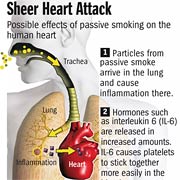 September 7, 2007 - In the 12 months following implementation of a nationwide smoking ban in Ireland, the number of hospital admissions for acute coronary syndrome decreased by 11%. While the decrease was impressive, Edward Cronin, M.D., of Cork University Hospital in Wilton, said the report was based on hospital records in just two counties -- Cork and Kerry. Moreover, he said "this is an observational study so we cannot prove an association between the smoking ban and the decline in [acute coronary syndrome] admissions."
September 7, 2007 - In the 12 months following implementation of a nationwide smoking ban in Ireland, the number of hospital admissions for acute coronary syndrome decreased by 11%. While the decrease was impressive, Edward Cronin, M.D., of Cork University Hospital in Wilton, said the report was based on hospital records in just two counties -- Cork and Kerry. Moreover, he said "this is an observational study so we cannot prove an association between the smoking ban and the decline in [acute coronary syndrome] admissions."
Nonetheless, Dr. Cronin said that these results follow a similar pattern reported in other nations and regions where smoking bans have been enacted. Dr. Cronin presented his findings at the European Society of Cardiology meeting here.
Ireland, which banned smoking in workplaces including restaurants and pubs on March 29, 2004, was the first European Union nation to enact a smoking ban. That action was particularly compelling given the fact that Ireland had the second highest rate of cardiovascular deaths among western European nations-only Finland posted higher cardiovascular mortality.
Dr. Cronin's study follows one published in April that reported an 83% reduction in indoor air pollution and an 80% drop in airborne carcinogens in Dublin restaurants and pubs in the 12 months following the ban. That reduction in secondhand smoke exposure was accompanied by significant reductions in respiratory illness among bar and restaurant workers.
Reference: ESC: Heart Attacks Decline Following Irish Smoking Ban by Peggy Peck, MedPage Today, 9/5/2007.
Click on image to enlarge..
Bringing the World of Tobacco Control closer together..
Ireland - reduction in admissions for acute coronary syndrome..
Subscribe to:
Post Comments (Atom)


To Provide Public Awareness
Purpose
About Us
Contact Us
2008 HIGHLIGHTS
TOPIX PAPERS - 2008 & 2009..
Archive
-
▼
2007 (248)
-
▼
09/02 - 09/09 (7)
- Fred Thompson: Al Qaeda smoking ban pushed Iraqis ...
- NO Camel SNUS ad appeared in the What's Up Section...
- PM USA Raises Cigarette Prices..
- Ireland - reduction in admissions for acute corona...
- Husky Smokeless Tobacco..
- Smokefree NZ within 10 years ..
- U.S. Presidential Candidates Receiving Money from ...
-
▼
09/02 - 09/09 (7)
© Copyright Notice: The content of this website is for information education purposes only and any newsbrief may be used only as "fair use" for information/education purposes with permission of the authors and providing that original references and associated reference links are included in HTML format.
0 comments:
Post a Comment